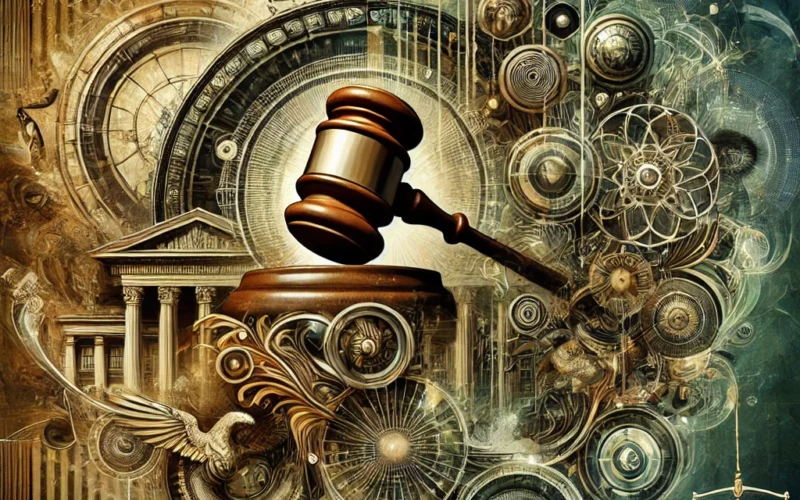In our daily lives, laws shape the way we behave and interact with one another, yet it’s not always wisdom that guides these rules. As the quote “it is not wisdom but authority that makes a law. t – tymoff” suggests, the laws we follow are often created and enforced by those in power, whether or not they reflect the collective wisdom of society. This concept can feel uncomfortable, but it’s a crucial part of understanding how authority works in law-making.
Defining Authority and Wisdom in Law
Authority refers to the power held by individuals or institutions to create, implement, and enforce laws. These entities, such as lawmakers, judges, and government officials, have the legal right to dictate how society operates. Wisdom, on the other hand, is the application of knowledge, experience, and sound judgment to make decisions that benefit society as a whole.
Authority and wisdom often operate separately in the realm of law. Authority can exist without wisdom, resulting in laws that may serve specific interests rather than the broader public good. The tension between these two forces raises important questions about the fairness and justice of our legal systems.
Philosophical Analysis of Authority in Law
The relationship between authority and law has been a subject of philosophical debate for centuries. Thinkers like Thomas Hobbes and John Locke have differing views on whether authority alone should dictate laws or if wisdom plays a more significant role.
Hobbes and Authority
Hobbes believed that authority, especially centralized authority, is necessary to prevent chaos and maintain order. In his view, without strong authority, society would descend into what he called a “state of nature,” where life would be “nasty, brutish, and short.”
Locke and the Balance
On the other hand, John Locke argued for a balance between authority and the will of the people, suggesting that wisdom in the form of collective social contracts should guide the creation of laws. This debate continues today, as societies wrestle with whether laws should primarily be driven by the enforcement power of authority or the considered wisdom of what benefits society.
The Historical Context of Authority-Driven Laws
Throughout history, authority has often shaped laws, sometimes to the detriment of wisdom. In ancient civilizations such as Mesopotamia and Egypt, rulers like Hammurabi and the Pharaohs created laws based on their authority alone. Their power was unquestioned, and the people had no choice but to follow the laws, regardless of their fairness.
The Code of Hammurabi
The famous Code of Hammurabi, for example, is one of the earliest known legal documents. It was created by King Hammurabi of Babylon, who used his authority to establish rules that governed every aspect of life. While some of these laws were just, others were harsh and disproportionately favored the elite.
Jim Crow Laws and Modern Examples
Similarly, authority-driven laws have also played a dark role in more recent history. During the Jim Crow era in the United States, laws enforcing racial segregation were created by those in power. These laws, while authoritative, were not wise, as they perpetuated injustice and inequality for millions of people.
Global Perspectives on Law-Making and Authority
Different regions around the world have varying perspectives on how authority influences law-making. In authoritarian regimes, the power of authority is absolute, and the wisdom of the people is often ignored.
Authoritarian Regimes
Countries like North Korea or China have laws that are rigidly enforced by authority, often with little input from citizens. These laws serve the interests of the state or the ruling party, not necessarily the public.
Democratic Societies
In contrast, democratic societies attempt to balance authority and wisdom. In places like the United States, the European Union, or Canada, lawmakers are elected to represent the people, and their authority is theoretically derived from the will of the populace. However, even in democracies, authority can overshadow wisdom. Lobbying, political agendas, and corporate interests sometimes skew the law-making process, leading to laws that favor a few rather than the many.
Authority vs. Wisdom: Understanding the Balance
The tension between authority and wisdom in law-making comes down to a key question: should laws be enforced simply because those in power say so, or should they reflect deeper, more thoughtful consideration of what benefits society?
Authority-Driven Laws
Laws that are solely authority-driven tend to focus on control and order. They are quick to enforce but often lack the nuance that wisdom can bring. For example, the “Stand Your Ground” laws in the United States allow individuals to use force in self-defense without the obligation to retreat. While these laws serve the interests of authority by providing clear rules, critics argue that they lack the wisdom needed to prevent unnecessary violence.
Wisdom-Influenced Laws
On the other hand, laws driven by wisdom often aim to create long-term benefits for society. These laws tend to be more flexible and considerate of the complexities of human behavior. For instance, the progressive social policies in Nordic countries, such as universal healthcare and education, are examples of laws influenced by collective wisdom rather than raw authority.
The Role of Technology in Shaping Modern Law
In today’s world, technology is dramatically shifting the balance of authority in law-making. Governments now use technology like AI, big data, and surveillance to create and enforce laws. While these tools give authorities more power to maintain order, they also raise questions about privacy and individual freedoms.
Surveillance and Privacy Concerns
For example, China’s use of facial recognition technology and social credit systems gives the government an unprecedented level of authority over its citizens. This technological authority can be beneficial in maintaining social order, but it lacks the wisdom to ensure that citizens’ rights and privacy are protected.
Authority and the Judiciary: Interpreting Laws with Wisdom
The judiciary plays a crucial role in balancing authority and wisdom in legal systems. While laws are created by authority, judges are responsible for interpreting these laws with wisdom. This interpretive power allows the judiciary to mitigate the sometimes harsh consequences of authority-driven laws.
The Importance of Judicial Interpretation
A famous example is the U.S. Supreme Court’s ruling in Brown v. Board of Education, which declared that racial segregation in public schools was unconstitutional. The law, as it stood before the ruling, was authoritative but lacked wisdom. By interpreting the law with wisdom, the judiciary helped correct a major injustice.
The Role of Civil Society in Challenging Unjust Laws
Civil society and grassroots movements have long been powerful forces in challenging laws that are based purely on authority. Social movements, protests, and advocacy campaigns bring wisdom to the forefront by highlighting injustices and pushing for reform.
Historical Examples of Civil Society Impact
The Civil Rights Movement in the United States is a prime example of how wisdom can challenge authority. Through peaceful protests and legal action, civil rights activists successfully overturned authoritative laws like Jim Crow, which had enforced racial segregation.
Ethical Considerations in Authority-Based Laws
One of the most significant issues with authority-driven laws is the potential for abuse. When laws are made without wisdom, they can become tools of oppression.
Historical Lessons from Authoritarian Regimes
For example, during Apartheid in South Africa, laws were used to maintain racial dominance and segregation. These laws served the authority of the state but were ethically and morally wrong.
The Importance of Ethical Law-Making
Ethics demand that laws not only serve the interests of those in power but also promote justice, fairness, and equality. Laws that fail to incorporate wisdom often lead to social unrest, resistance, and, in extreme cases, revolutions.
Case Studies of Authority-Driven Laws
Prohibition in the United States
The 1920s saw the enforcement of Prohibition laws in the U.S., driven entirely by authority. These laws banned the production and sale of alcohol, but they lacked the wisdom to understand societal needs. As a result, Prohibition led to widespread criminal activity and was eventually repealed.
The Civil Rights Act (1964)
On the other hand, the Civil Rights Act was a law born from the intersection of authority and wisdom. While it was enforced by government authority, it was influenced by the wisdom of civil rights leaders who understood the need for racial equality.
Conclusion: Balancing Authority and Wisdom in Law
In conclusion, the statement “it is not wisdom but authority that makes a law. t – tymoff” captures a fundamental truth about how laws are made. Authority plays a significant role in shaping legal systems, but without the balance of wisdom, laws can become unjust or ineffective.
The ideal legal framework balances the power of authority with the insights of wisdom. Laws should not only be enforceable but also fair, just, and beneficial to society as a whole. By ensuring that wisdom guides authority, we can create laws that are not only followed but respected.

